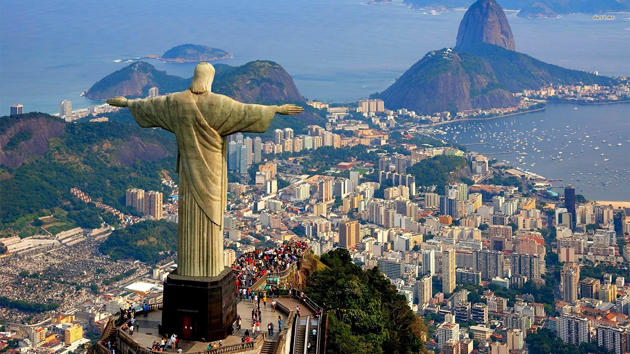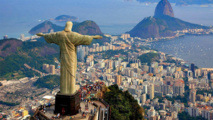They are doing so some 2,000 years after Christian iconography began in nearby Jerusalem -- also where Christians believe Jesus was resurrected after his crucifixion, to be commemorated this Sunday for Easter.
They work in both silence and in prayer, with their art a far cry from the cheap mass-produced icons sold in souvenir shops to tourists and pilgrims.
"Icons are not commercial objects for us, but holy images that we honour," said Nicola Juha, who heads the Bethlehem Icon Centre.
He explains that icons like theirs are used by worshippers who, for example, light candles before them and pray.
According to tradition, Luke the Evangelist painted the first Christian icon in 60 AD.
Ian Knowles, far from his native Britain, now teaches the same art to not only Palestinian Christians, but also those from countries including Canada and Poland.
Watching the meticulous brushstrokes of his students, he said he left home to spend two weeks in the region and was still there nine years later.
One of his pieces, "Our Lady of Palestine", depicts Mary shedding a tear over symbols of the Holy Land -- Jerusalem, Mount Carmel and Mount Nebo.
In a nearby chapel with a blue ceiling and a Nativity scene, around a dozen students recite prayers, their nearly finished icons in hand.
Archbishop Joseph Jules Zerey of the Melkite Greek Catholic Church, which sponsors the iconography centre, blesses each one, holding an olive branch with holy oil.
- 'A beautiful synthesis' -
Each icon is unique and produced to order. Animal-hair brushes are selected in Jerusalem or even London, and the pigments come directly from the Holy Land.
Hand-ground stones for yellow are from Jericho and roses used to paint faces are from Jerusalem, Juha said in the small woodworking shop where panels for the icons are carved.
Rose Codneler, who has used a holiday from her work at a women's shelter in Britain to spend Easter week in Bethlehem, said the uniqueness of the icons appeals to her.
For the 33-year-old Christian, spending days painstakingly painting Christ's face is "a way of getting deeper into the characters of the Bible and the story of the Bible".
"Icons have always fascinating me, and more and more so in the last few years, because they are a kind of beautiful synthesis of God, prayer and also ecology in the way that the pigments are all taken from nature," she said.
Knowles's class is provided periodically to visiting pilgrims for around $265 (250 euros) and all year round to some 30 Palestinian Christians.
Juha says the centre has succeeded in "reviving an old, long-forgotten Palestinian tradition in Bethlehem, which is so important both in religious and geographic terms".
- 'Iconography as a profession' -
Bethlehem is part of the West Bank, the Palestinian territory that has been occupied by Israel for 50 years and which struggles with unemployment and poverty.
Knowles points out that obtaining the best materials from Jerusalem is impossible for many Palestinians since they are barred from crossing over from the West Bank.
Wearing a paint-stained apron, he says the centre is also a way of serving the local Christian communities.
Christians have gone from 20 percent of the Palestinian population to slightly more than one percent over the course of 50 years.
"I wanted to do something which could really help to rebuild the iconography as a proper tradition and a constituent part of the Christian community here," he said.
"I think people know the Christian population in Bethlehem has been devastated over the last 50 years."
Knowles said that "culturally, the Christian community is a bit on its own, so it seems to me that it was an important thing that I could offer -- to teach iconography as a profession rather just as a hobby".
This year, 36 Palestinians have registered, paying fees of around 25 euros.
A partnership has also been formed with The Prince's School of Traditional Arts in London, allowing 10 Bethlehem students to earn a British diploma in iconography recognised worldwide.
The centre has already achieved one particular point of pride: Knowles and three of his students have produced two icons for Lichfield Cathedral in Britain and are to complete a third next summer.
---------------------------------------------------------------------------------------------------------------------------------
They work in both silence and in prayer, with their art a far cry from the cheap mass-produced icons sold in souvenir shops to tourists and pilgrims.
"Icons are not commercial objects for us, but holy images that we honour," said Nicola Juha, who heads the Bethlehem Icon Centre.
He explains that icons like theirs are used by worshippers who, for example, light candles before them and pray.
According to tradition, Luke the Evangelist painted the first Christian icon in 60 AD.
Ian Knowles, far from his native Britain, now teaches the same art to not only Palestinian Christians, but also those from countries including Canada and Poland.
Watching the meticulous brushstrokes of his students, he said he left home to spend two weeks in the region and was still there nine years later.
One of his pieces, "Our Lady of Palestine", depicts Mary shedding a tear over symbols of the Holy Land -- Jerusalem, Mount Carmel and Mount Nebo.
In a nearby chapel with a blue ceiling and a Nativity scene, around a dozen students recite prayers, their nearly finished icons in hand.
Archbishop Joseph Jules Zerey of the Melkite Greek Catholic Church, which sponsors the iconography centre, blesses each one, holding an olive branch with holy oil.
- 'A beautiful synthesis' -
Each icon is unique and produced to order. Animal-hair brushes are selected in Jerusalem or even London, and the pigments come directly from the Holy Land.
Hand-ground stones for yellow are from Jericho and roses used to paint faces are from Jerusalem, Juha said in the small woodworking shop where panels for the icons are carved.
Rose Codneler, who has used a holiday from her work at a women's shelter in Britain to spend Easter week in Bethlehem, said the uniqueness of the icons appeals to her.
For the 33-year-old Christian, spending days painstakingly painting Christ's face is "a way of getting deeper into the characters of the Bible and the story of the Bible".
"Icons have always fascinating me, and more and more so in the last few years, because they are a kind of beautiful synthesis of God, prayer and also ecology in the way that the pigments are all taken from nature," she said.
Knowles's class is provided periodically to visiting pilgrims for around $265 (250 euros) and all year round to some 30 Palestinian Christians.
Juha says the centre has succeeded in "reviving an old, long-forgotten Palestinian tradition in Bethlehem, which is so important both in religious and geographic terms".
- 'Iconography as a profession' -
Bethlehem is part of the West Bank, the Palestinian territory that has been occupied by Israel for 50 years and which struggles with unemployment and poverty.
Knowles points out that obtaining the best materials from Jerusalem is impossible for many Palestinians since they are barred from crossing over from the West Bank.
Wearing a paint-stained apron, he says the centre is also a way of serving the local Christian communities.
Christians have gone from 20 percent of the Palestinian population to slightly more than one percent over the course of 50 years.
"I wanted to do something which could really help to rebuild the iconography as a proper tradition and a constituent part of the Christian community here," he said.
"I think people know the Christian population in Bethlehem has been devastated over the last 50 years."
Knowles said that "culturally, the Christian community is a bit on its own, so it seems to me that it was an important thing that I could offer -- to teach iconography as a profession rather just as a hobby".
This year, 36 Palestinians have registered, paying fees of around 25 euros.
A partnership has also been formed with The Prince's School of Traditional Arts in London, allowing 10 Bethlehem students to earn a British diploma in iconography recognised worldwide.
The centre has already achieved one particular point of pride: Knowles and three of his students have produced two icons for Lichfield Cathedral in Britain and are to complete a third next summer.
---------------------------------------------------------------------------------------------------------------------------------









 Home
Home Politics
Politics











